 With an award-winning career ranging from diplomat and international keynote speaker to business and public sector leader, Ziena has helped some of New Zealand’s largest businesses build their reputation and revenue, advised Ministers, led large-scale change and transformation programmes, and supported Māori, Pacific and ethnic women and young people into leadership roles. Her current portfolio includes leadership and governance roles across the public, private and not-for-profit sectors including as Commissioner for the Natural Hazards Commission Toka Tū Ake and Deputy Chief Executive at Te Pūkenga – New Zealand Institute of Skills and Technology. Recognised by Campaign Asia Pacific as part of its 2020 Women to Watch, a group of 40 outstanding women in the Asia Pacific, Ziena has received several international awards for her work promoting New Zealand trade, investment and education in Asia, where she was based for ten years including as Education New Zealand Regional Director for South and Southeast Asia, New Zealand Trade Commissioner to Singapore and Head of North Asia Marketing and Communications for New Zealand Trade and Enterprise. She holds a Master of Arts (First Class Hons) in International Relations and Politics from the University of Auckland, a Bachelor of Communication Studies, and Diploma of International Trade.
With an award-winning career ranging from diplomat and international keynote speaker to business and public sector leader, Ziena has helped some of New Zealand’s largest businesses build their reputation and revenue, advised Ministers, led large-scale change and transformation programmes, and supported Māori, Pacific and ethnic women and young people into leadership roles. Her current portfolio includes leadership and governance roles across the public, private and not-for-profit sectors including as Commissioner for the Natural Hazards Commission Toka Tū Ake and Deputy Chief Executive at Te Pūkenga – New Zealand Institute of Skills and Technology. Recognised by Campaign Asia Pacific as part of its 2020 Women to Watch, a group of 40 outstanding women in the Asia Pacific, Ziena has received several international awards for her work promoting New Zealand trade, investment and education in Asia, where she was based for ten years including as Education New Zealand Regional Director for South and Southeast Asia, New Zealand Trade Commissioner to Singapore and Head of North Asia Marketing and Communications for New Zealand Trade and Enterprise. She holds a Master of Arts (First Class Hons) in International Relations and Politics from the University of Auckland, a Bachelor of Communication Studies, and Diploma of International Trade.
An ageing population, an ageing workforce and a sector that relies heavily on a diverse and largely migrant workforce presents unique challenges for ARC. It takes dynamic leadership to be able navigate an inter-generational, multi-cultural workplace, and support your whole team to thrive. Ziena will provide an inspiring and personal perspective on how to shape a resilient, future-ready workforce.
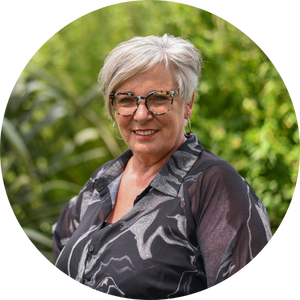 Anna is a Registered Nurse with 36 years of experience in New Zealand and Canada. She holds a Postgraduate Diploma in Nursing Leadership, a Brain-Based Coaching Certificate, and a Professional Supervision Certificate. Her public health career spanned leadership roles including Charge Nurse, After Hours Coordinator, Unit Manager and Associate Director of Nursing.
Anna is a Registered Nurse with 36 years of experience in New Zealand and Canada. She holds a Postgraduate Diploma in Nursing Leadership, a Brain-Based Coaching Certificate, and a Professional Supervision Certificate. Her public health career spanned leadership roles including Charge Nurse, After Hours Coordinator, Unit Manager and Associate Director of Nursing.
Since 2009, Anna has specialised in Aged Residential Care, turning around a failing facility and later founding her consultancy business to support others in the sector. She played a key role in Arohanui Hospice’s SEQUAL palliative care/ ARC project and now co-owns, with her husband Wayne, an award-winning aged residential care facility in Palmerston North.
Anna chairs the ACA Nursing Leadership Group and contributes to national advisory groups in palliative care and aged care policy. She is a passionate advocate for the nursing profession and continues to mentor through leadership coaching and professional supervision.
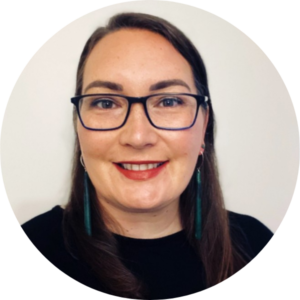 Emma is an experienced Nurse Practitioner, currently working in rural Primary Care. Emma has a special interest in Palliative and End of Life Care. Emma has held previous roles as a Nurse Practitioner in Aged Care and Specialist Palliative Care. Prior to becoming a Nurse Practitioner Emma worked in Oncology, Haematology and Community Hospice for much of her career. Emma is on the executive for Nurse Practitioners New Zealand and is a member of the Te Whatu Ora National Palliative Care Steering Group.
Emma is an experienced Nurse Practitioner, currently working in rural Primary Care. Emma has a special interest in Palliative and End of Life Care. Emma has held previous roles as a Nurse Practitioner in Aged Care and Specialist Palliative Care. Prior to becoming a Nurse Practitioner Emma worked in Oncology, Haematology and Community Hospice for much of her career. Emma is on the executive for Nurse Practitioners New Zealand and is a member of the Te Whatu Ora National Palliative Care Steering Group.
This presentation is designed to provide healthcare professionals with the essential tools to offer compassionate and comprehensive care for older people with life-limiting illnesses. We will delve into key aspects of managing older people with chronic and life-limiting conditions. Focusing on the benefits of early palliative care interventions, including Advance Care Planning. Strategies for integrating palliative care will be discussed, focusing on communication skills, symptom management, enhancing quality of life, and providing psychological support. This holistic approach empowers healthcare workers to provide individualized and culturally appropriate care that aligns with the person and whānau goals and values. The presentation will also cover end-of-life care, including how to recognize when a person is dying and the role of specialist palliative care services. We will finish with an overview of Assisted Dying in Aotearoa, outlining legal responsibilities and the role of healthcare providers in facilitating access to this service.
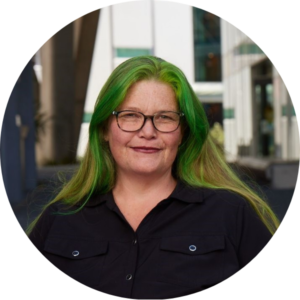 Katherine Ravenswood is a professor in the Faculty of Business, Economics and Law at AUT. She is an employment relations expert, focusing on macro and workplace issues for the care and support workforce. In addition to roles on working groups and committees for the Ministry of Health and Human Rights Commission, she has provided expert evidence to government agencies in Australia, think tanks in the UK and to the OECD. Her research is funded the NZ Health Research Council, the Royal Society Marsden Grant and the MBIE Industrial Relations foundation.
Katherine Ravenswood is a professor in the Faculty of Business, Economics and Law at AUT. She is an employment relations expert, focusing on macro and workplace issues for the care and support workforce. In addition to roles on working groups and committees for the Ministry of Health and Human Rights Commission, she has provided expert evidence to government agencies in Australia, think tanks in the UK and to the OECD. Her research is funded the NZ Health Research Council, the Royal Society Marsden Grant and the MBIE Industrial Relations foundation.
We often think about workplace violence in relation to particular events or incidents and frame it as an issue between individuals. This perspective limits the way in which we can prevent and mitigate WPV and opens it up for a ‘blame game’. This is significant in healthcare organisations because of the complexity of relationships between co-workers, clients, community and healthcare systems. This presentation gives an overview of some recent data on WPV, introduces the ‘socio-ecological’ framework for understanding and assessing workplace violence, and concludes with some suggestions for best practice workplace violence prevention in care and support work.
 Anu is a passionate nurse leader who switched to Aged care after 14 years of working in Critical care lead position as a Nurse. After moving to NZ in 2018, she has enjoyed working in Aged care and is passionate about being a strong advocate for elderly in the community. Currently working as the Clinical Manager at Promisia Aldwins House in Christchurch she enjoys being the voice and lead for residents – with a strong passion for End of life care, Palliative care, Pain Management, mental health in elderly, clinical education, quality reviews and cultural assessments as her key areas.
Anu is a passionate nurse leader who switched to Aged care after 14 years of working in Critical care lead position as a Nurse. After moving to NZ in 2018, she has enjoyed working in Aged care and is passionate about being a strong advocate for elderly in the community. Currently working as the Clinical Manager at Promisia Aldwins House in Christchurch she enjoys being the voice and lead for residents – with a strong passion for End of life care, Palliative care, Pain Management, mental health in elderly, clinical education, quality reviews and cultural assessments as her key areas.
Anu is active among the Indian Community over last few years and served as the President of the Indian Community in Southland guiding migrants who come to the country and working closely with the Ministry of Ethnic development. She has been a Nurse Preceptor for the IQN CAP programme in the Southland region bridging and mentoring IQN during their transition as NZRN. Anu is one of the first IQN to collaborate with Otago University and SIT to initiate and bring CAP programme to the region of Southland which has been a game changer within the region . Out of work she loves being engaged in Community roles, Travelling, promoting cultural heritage through children and Hosting events.
 Riha Devendra is a Registered Nurse originally from Fiji, bringing a wealth of diverse clinical experience to his role as Clinical Team Lead. After relocating to Aotearoa in 2022, he initially worked as a caregiver before successfully completing his Competency Assessment Programme (CAP) later that year. Within his first year as a Registered Nurse, Riha progressed into a leadership position — a testament to his clinical excellence, leadership capability, and commitment to high-quality care.
Riha Devendra is a Registered Nurse originally from Fiji, bringing a wealth of diverse clinical experience to his role as Clinical Team Lead. After relocating to Aotearoa in 2022, he initially worked as a caregiver before successfully completing his Competency Assessment Programme (CAP) later that year. Within his first year as a Registered Nurse, Riha progressed into a leadership position — a testament to his clinical excellence, leadership capability, and commitment to high-quality care.
Riha’s career in Fiji spanned critical care, cardiovascular nursing, emergency medicine, and medical evacuation. His fearless dedication led him to frontline roles as a Critical Care Flight Nurse, Medical Evacuation Coordinator, and leader of nursing services across Fiji’s corrections divisions reflecting a profound commitment to saving lives and serving communities in their most vulnerable moments.
Initially, Riha questioned if aged care was his calling after years of adrenaline-fueled, life-saving work. But through his work with older adults, he discovered a transformative passion. He now champions the complexity, dignity, and profound humanity of aged care nursing. His vision is clear: to redefine aged care through innovation, advocacy, and unwavering respect for the elderly. Today, he is working towards becoming a Nurse Practitioner specializing in aged care, determined to elevate standards and inspire the next generation of aged care workforce.
In his session, Riha will share his heartfelt journey of resilience from starting anew in a foreign country to finding his true purpose in aged care. He’ll speak with honesty about the challenges of rebuilding his career, the cultural shifts he navigated, and the mentors who ignited his passion for gerontology. His story is a rally for perseverance, reinvention, and the transformative power of empathy. Through his eyes, audiences will see aged care not as an endpoint, but as a calling that demands courage, heart, and an unyielding belief in the value of every life, at every stage.
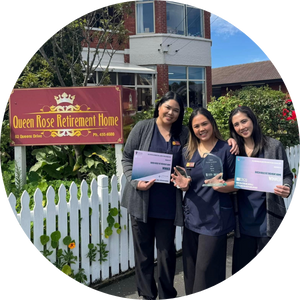 Queen Rose Retirement Home is a boutique aged care facility co-owned and operated by Andrea De Leon, Elaine Martinez, and Elyana Castillo. Together, they have created a warm, personalised environment where compassionate care, dignity, and community are at the heart of everything they do. Their shared vision and hands-on leadership recently earned Queen Rose the coveted Overall Excellence in Aged Care Award, which led to their invitation to speak at this year’s symposium.
Queen Rose Retirement Home is a boutique aged care facility co-owned and operated by Andrea De Leon, Elaine Martinez, and Elyana Castillo. Together, they have created a warm, personalised environment where compassionate care, dignity, and community are at the heart of everything they do. Their shared vision and hands-on leadership recently earned Queen Rose the coveted Overall Excellence in Aged Care Award, which led to their invitation to speak at this year’s symposium.
Andrea, with a background in nursing and leadership, brings both heart and strategy to the business. Elaine, as the Activities Coordinator, plays a vital role in designing programs that bring joy, connection, and meaning to residents’ daily lives. Elyana, drawing from her early childhood education (ECE) background, has naturally transitioned into a nurturing and effective Care Manager, known for her empathetic leadership and ability to build strong rapport with both residents and staff.
At this year’s symposium, the Andrea, Elaine and Elyana will speak on “Reigniting Passion in Aged Care”—a timely reminder of why we entered this field in the first place. Drawing from real-life experiences at Queen Rose, the trio will share practical strategies to reconnect with purpose, boost team morale, and lead with renewed energy in today’s ever-evolving care landscape.
 Kanoa is a bright light in New Zealand broadcasting. Having made her name in children’s television, she successfully transitioned to primetime, first as weather presenter for Newshub and now known as former host of The Project, weeknights at 7pm on Three.
Kanoa is a bright light in New Zealand broadcasting. Having made her name in children’s television, she successfully transitioned to primetime, first as weather presenter for Newshub and now known as former host of The Project, weeknights at 7pm on Three.
 Dr. Rose Joudi (Ph.D. Psych.) is a certified consultant specialising in ageing and ethnic diversity, an international speaker on ethnocultural diversity, older adult mistreatment, and ageism, and a facilitator with expertise in Psychological First Aid, Natural Supports, and Trauma-Informed Care.
Dr. Rose Joudi (Ph.D. Psych.) is a certified consultant specialising in ageing and ethnic diversity, an international speaker on ethnocultural diversity, older adult mistreatment, and ageism, and a facilitator with expertise in Psychological First Aid, Natural Supports, and Trauma-Informed Care. Nadine Gray (Te Whakatōhea) is the National Chief Nursing Officer for Health New Zealand | Te Whatu Ora, commencing the inaugural role in July 2024.
Nadine Gray (Te Whakatōhea) is the National Chief Nursing Officer for Health New Zealand | Te Whatu Ora, commencing the inaugural role in July 2024. Cheyne is a Registered Nurse and seasoned Healthcare Executive with over 30 years’ experience in Public and Private healthcare in Australia and New Zealand. She is a Fellow of the College of Nurses Australia, and is an Adjunct Professor with Deakin University where she shares her insights and experience with the next generation of learners. She holds a Bachelor of Health Science (Nursing) from Manukau Institute of Technology and a Master’s in Health Services Management from Massey University. She is also a member of the Institute of Directors and Global Women in New Zealand. Cheyne has been an active member of the ACA Nursing Leadership Group since its inception in 2020.
Cheyne is a Registered Nurse and seasoned Healthcare Executive with over 30 years’ experience in Public and Private healthcare in Australia and New Zealand. She is a Fellow of the College of Nurses Australia, and is an Adjunct Professor with Deakin University where she shares her insights and experience with the next generation of learners. She holds a Bachelor of Health Science (Nursing) from Manukau Institute of Technology and a Master’s in Health Services Management from Massey University. She is also a member of the Institute of Directors and Global Women in New Zealand. Cheyne has been an active member of the ACA Nursing Leadership Group since its inception in 2020. Regan Gilchrist is a Registered Nurse who has worked in the aged residential care sector his entire nursing career. He works as a Clinical Nurse Manager for the largest aged care facility in Otago and Southland, that lies beneath a larger organisation. Regan is passionate about caring for older people, aged care, as well as promoting this area of nursing for our most vulnerable. Regan holds special interests in infection control, end of life care, and nursing education.
Regan Gilchrist is a Registered Nurse who has worked in the aged residential care sector his entire nursing career. He works as a Clinical Nurse Manager for the largest aged care facility in Otago and Southland, that lies beneath a larger organisation. Regan is passionate about caring for older people, aged care, as well as promoting this area of nursing for our most vulnerable. Regan holds special interests in infection control, end of life care, and nursing education.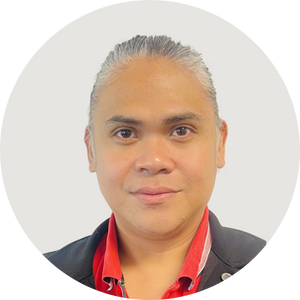 Blesster Saga hails from the tropical islands of the Philippines, where he began his healthcare journey by earning a Bachelor of Science in Nursing from the University of Cebu – Banilad Campus. During his studies, he was recognized with a leadership award, a reflection of his early commitment to excellence and service. His nursing career took root in the operating theatre before he set out on a life-changing adventure to New Zealand in 2012. Later that year, he completed a Graduate Certificate in Infection Prevention and Control at Wairiki Institute of Technology’s Mokia Campus in Rotorua (now Toi Ohomai Polytechnic), marking the beginning of a remarkable healthcare career in his adopted country.
Blesster Saga hails from the tropical islands of the Philippines, where he began his healthcare journey by earning a Bachelor of Science in Nursing from the University of Cebu – Banilad Campus. During his studies, he was recognized with a leadership award, a reflection of his early commitment to excellence and service. His nursing career took root in the operating theatre before he set out on a life-changing adventure to New Zealand in 2012. Later that year, he completed a Graduate Certificate in Infection Prevention and Control at Wairiki Institute of Technology’s Mokia Campus in Rotorua (now Toi Ohomai Polytechnic), marking the beginning of a remarkable healthcare career in his adopted country.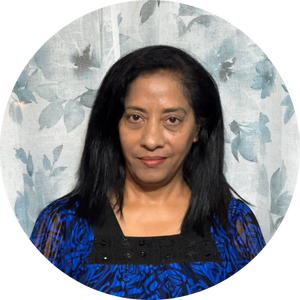 Agustilia Rodrigues is a senior academic who migrated to New Zealand 25 years ago. She trained as a Registered Nurse in India and then completed her Masters in Nursing Sciences at Massey University. She has worked in a variety of practice settings and completed post graduate qualifications in primary health and respiratory specialties. Agustilia has been actively involved in research during her tenure as Senior Nurse Lecturer at Te Pukenga for the past 15 years. Her research interests and outputs include building employability skills, improving health workforce in aged care and mental health, the use of simulation in training and the flipped classroom model.
Agustilia Rodrigues is a senior academic who migrated to New Zealand 25 years ago. She trained as a Registered Nurse in India and then completed her Masters in Nursing Sciences at Massey University. She has worked in a variety of practice settings and completed post graduate qualifications in primary health and respiratory specialties. Agustilia has been actively involved in research during her tenure as Senior Nurse Lecturer at Te Pukenga for the past 15 years. Her research interests and outputs include building employability skills, improving health workforce in aged care and mental health, the use of simulation in training and the flipped classroom model. With an award-winning career ranging from diplomat and international keynote speaker to business and public sector leader, Ziena has helped some of New Zealand’s largest businesses build their reputation and revenue, advised Ministers, led large-scale change and transformation programmes, and supported Māori, Pacific and ethnic women and young people into leadership roles. Her current portfolio includes leadership and governance roles across the public, private and not-for-profit sectors including as Commissioner for the Natural Hazards Commission Toka Tū Ake and Deputy Chief Executive at Te Pūkenga – New Zealand Institute of Skills and Technology. Recognised by Campaign Asia Pacific as part of its 2020 Women to Watch, a group of 40 outstanding women in the Asia Pacific, Ziena has received several international awards for her work promoting New Zealand trade, investment and education in Asia, where she was based for ten years including as Education New Zealand Regional Director for South and Southeast Asia, New Zealand Trade Commissioner to Singapore and Head of North Asia Marketing and Communications for New Zealand Trade and Enterprise. She holds a Master of Arts (First Class Hons) in International Relations and Politics from the University of Auckland, a Bachelor of Communication Studies, and Diploma of International Trade.
With an award-winning career ranging from diplomat and international keynote speaker to business and public sector leader, Ziena has helped some of New Zealand’s largest businesses build their reputation and revenue, advised Ministers, led large-scale change and transformation programmes, and supported Māori, Pacific and ethnic women and young people into leadership roles. Her current portfolio includes leadership and governance roles across the public, private and not-for-profit sectors including as Commissioner for the Natural Hazards Commission Toka Tū Ake and Deputy Chief Executive at Te Pūkenga – New Zealand Institute of Skills and Technology. Recognised by Campaign Asia Pacific as part of its 2020 Women to Watch, a group of 40 outstanding women in the Asia Pacific, Ziena has received several international awards for her work promoting New Zealand trade, investment and education in Asia, where she was based for ten years including as Education New Zealand Regional Director for South and Southeast Asia, New Zealand Trade Commissioner to Singapore and Head of North Asia Marketing and Communications for New Zealand Trade and Enterprise. She holds a Master of Arts (First Class Hons) in International Relations and Politics from the University of Auckland, a Bachelor of Communication Studies, and Diploma of International Trade. Anna is a Registered Nurse with 36 years of experience in New Zealand and Canada. She holds a Postgraduate Diploma in Nursing Leadership, a Brain-Based Coaching Certificate, and a Professional Supervision Certificate. Her public health career spanned leadership roles including Charge Nurse, After Hours Coordinator, Unit Manager and Associate Director of Nursing.
Anna is a Registered Nurse with 36 years of experience in New Zealand and Canada. She holds a Postgraduate Diploma in Nursing Leadership, a Brain-Based Coaching Certificate, and a Professional Supervision Certificate. Her public health career spanned leadership roles including Charge Nurse, After Hours Coordinator, Unit Manager and Associate Director of Nursing. Emma is an experienced Nurse Practitioner, currently working in rural Primary Care. Emma has a special interest in Palliative and End of Life Care. Emma has held previous roles as a Nurse Practitioner in Aged Care and Specialist Palliative Care. Prior to becoming a Nurse Practitioner Emma worked in Oncology, Haematology and Community Hospice for much of her career. Emma is on the executive for Nurse Practitioners New Zealand and is a member of the Te Whatu Ora National Palliative Care Steering Group.
Emma is an experienced Nurse Practitioner, currently working in rural Primary Care. Emma has a special interest in Palliative and End of Life Care. Emma has held previous roles as a Nurse Practitioner in Aged Care and Specialist Palliative Care. Prior to becoming a Nurse Practitioner Emma worked in Oncology, Haematology and Community Hospice for much of her career. Emma is on the executive for Nurse Practitioners New Zealand and is a member of the Te Whatu Ora National Palliative Care Steering Group. Katherine Ravenswood is a professor in the Faculty of Business, Economics and Law at AUT. She is an employment relations expert, focusing on macro and workplace issues for the care and support workforce. In addition to roles on working groups and committees for the Ministry of Health and Human Rights Commission, she has provided expert evidence to government agencies in Australia, think tanks in the UK and to the OECD. Her research is funded the NZ Health Research Council, the Royal Society Marsden Grant and the MBIE Industrial Relations foundation.
Katherine Ravenswood is a professor in the Faculty of Business, Economics and Law at AUT. She is an employment relations expert, focusing on macro and workplace issues for the care and support workforce. In addition to roles on working groups and committees for the Ministry of Health and Human Rights Commission, she has provided expert evidence to government agencies in Australia, think tanks in the UK and to the OECD. Her research is funded the NZ Health Research Council, the Royal Society Marsden Grant and the MBIE Industrial Relations foundation. Anu is a passionate nurse leader who switched to Aged care after 14 years of working in Critical care lead position as a Nurse. After moving to NZ in 2018, she has enjoyed working in Aged care and is passionate about being a strong advocate for elderly in the community. Currently working as the Clinical Manager at Promisia Aldwins House in Christchurch she enjoys being the voice and lead for residents – with a strong passion for End of life care, Palliative care, Pain Management, mental health in elderly, clinical education, quality reviews and cultural assessments as her key areas.
Anu is a passionate nurse leader who switched to Aged care after 14 years of working in Critical care lead position as a Nurse. After moving to NZ in 2018, she has enjoyed working in Aged care and is passionate about being a strong advocate for elderly in the community. Currently working as the Clinical Manager at Promisia Aldwins House in Christchurch she enjoys being the voice and lead for residents – with a strong passion for End of life care, Palliative care, Pain Management, mental health in elderly, clinical education, quality reviews and cultural assessments as her key areas. Riha Devendra is a Registered Nurse originally from Fiji, bringing a wealth of diverse clinical experience to his role as Clinical Team Lead. After relocating to Aotearoa in 2022, he initially worked as a caregiver before successfully completing his Competency Assessment Programme (CAP) later that year. Within his first year as a Registered Nurse, Riha progressed into a leadership position — a testament to his clinical excellence, leadership capability, and commitment to high-quality care.
Riha Devendra is a Registered Nurse originally from Fiji, bringing a wealth of diverse clinical experience to his role as Clinical Team Lead. After relocating to Aotearoa in 2022, he initially worked as a caregiver before successfully completing his Competency Assessment Programme (CAP) later that year. Within his first year as a Registered Nurse, Riha progressed into a leadership position — a testament to his clinical excellence, leadership capability, and commitment to high-quality care. Queen Rose Retirement Home is a boutique aged care facility co-owned and operated by Andrea De Leon, Elaine Martinez, and Elyana Castillo. Together, they have created a warm, personalised environment where compassionate care, dignity, and community are at the heart of everything they do. Their shared vision and hands-on leadership recently earned Queen Rose the coveted Overall Excellence in Aged Care Award, which led to their invitation to speak at this year’s symposium.
Queen Rose Retirement Home is a boutique aged care facility co-owned and operated by Andrea De Leon, Elaine Martinez, and Elyana Castillo. Together, they have created a warm, personalised environment where compassionate care, dignity, and community are at the heart of everything they do. Their shared vision and hands-on leadership recently earned Queen Rose the coveted Overall Excellence in Aged Care Award, which led to their invitation to speak at this year’s symposium.